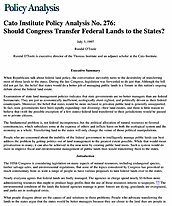When Republicans talk about federal land policy, the conversation inevitably turns to the desirability of transferring most of those lands to the states. During the last Congress, legislation was forwarded to do just that. Although the bill did not get far, the belief that states would do a better job of managing public lands is a fixture in this nation’s ongoing debate about the federal land estate.
Examination of state land management policies indicates that state governments are no better managers than are federal bureaucrats. They are just as economically inefficient, ecologically short-sighted, and politically driven as their federal counterparts. Moreover, the belief that states would be more inclined to privatize public land is generally unsupported. In fact, state governments have been rapidly expanding–not divesting–their land estates, and there is little reason to believe that (with the possible exception of a few states) federal land transferred to their jurisdictions would be passed on to private citizens.
The fundamental problem is, not federal incompetence, but the political allocation of natural resources to favored constituencies, which subsidizes some at the expense of others and inflicts harm on both the ecological system and the economy as a whole. Transferring land to the states will only change the venue of those political manipulations.
People who are concerned about the inability of the federal government to intelligently manage public lands can best address the problem by getting politics out of land management to the greatest extent possible. While that would mean privatization to many, it can also be achieved in the near term by creating public land trusts. Such a system would do more to improve fiscal and environmental management of public lands than would transferring them to the states.

This work is licensed under a Creative Commons Attribution-NonCommercial-ShareAlike 4.0 International License.

